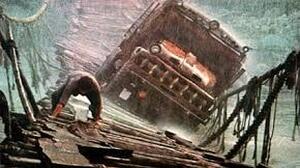Sorcerer

The New Hollywood era began in the late 1960’s, and experienced such sudden and undeniable success that studios shifted their focus from high-concept projects created by groups of big-name producers to idiosyncratic films driven by largely unproven directors. Supported by moderate budgeting and lacking significant studio supervision, this allowed for more personal and often provocative visions to be realized while still consistently turning a healthy profit. With each successive hit, directors gained further recognition and greater confidence, some reaching levels of fame rarely seen by those hidden behind the camera.
While several directors would connect with back-to-back releases and then cash-in their newfound freedom and power to realize their most ambitious dream project, it would be only a select few whose reach did not exceed their grasp. For some, this misstep would be an outlier in their canon, and they would return stronger than before. For others, it would represent an end to their run, with future success sporadic or sadly nonexistent.
Following up his Best Picture and Best Director winning “The French Connection” with the blockbuster cultural phenomenon “The Exorcist”, William Friedkin was in the enviable position of choosing as he wished for the subject of his next movie. With that in mind, he developed a few ideas over the ensuing months, ultimately deciding on a sci-fi tale involving UFOs and abducted military aircraft, to be named “The Devil’s Triangle”. However, before beginning on this complex production, he would first film a small-scale retelling of the French novel “The Wages of Fear”, which he would eventually title “Sorcerer”.
As production began in March 1976, Friedkin’s ambitions for “Sorcerer” had expanded, influenced by his disillusionment with “The Devil’s Triangle” upon hearing that Steven Spielberg was tackling aliens with his latest effort, as well as the news that Francis Ford Coppola (and Friedkin’s friendly rival) had begun his current picture deep in the jungles of the Philippines. Now sporting a budget of $15M and filming across international locations including the harsh terrain of the Dominican Republic, Friedkin intended “Sorcerer” as his magnum opus. Exploring the absurd unpredictability of life, the struggle against forces beyond one’s control, and the search for meaning in a hostile world, he would push himself and his crew to their physical and psychological limits.
The film opens with four separate and unrelated vignettes, each taking place in a separate part of the world. Following a hitman, a terrorist, an embezzler, and a thief, each find themselves on the wrong end of their luck and have hidden from their friends and enemies in an impoverished town buried within Columbia. The village is introduced with a documentary level realism, and the hopelessness of its inhabitants, which include our four main characters, is conveyed in every frame.
The story proper is then begun, announced with an oil refinery explosion and fire that rips through the screen with a volatile intensity. The corporation relying on this refinery demands its shipment. Hence, four desperate men are sought for a near impossible assignment.
Their mission: To transport several crates of highly unstable nitroglycerin-leaking dynamite in two unreliable trucks, to be used in creating an explosion that will extinguish the oil well fire. The journey involves navigating over two hundred miles of challenging terrain, including dense jungle, rickety bridges, and rough roads, all for the promise of a substantial reward. Beyond the elements and money, however, lurks the eternal struggle for redemption and survival in the eyes of an uncaring God.
From the first turn of the key, this is tough and rugged action filmmaking, with unbelievably dangerous risks clearly taken to establish the stakes up front. Beginning with the careful tracking of a massive truck along the perilous path of a decaying bridge, the suspense is unrelenting. Largely dialogue free, relying on the grinding of the gears and the creaking of the wooden pass for tension, the footage is visual storytelling at its finest.
Incredibly, this scene is just an introduction, as a wrong turn leaves both trucks facing a decrepit suspension bridge spanning a raging river in the middle of a monsoon level rainfall. In one of the truly great action sequences of cinema, the camera holds still as each truck struggles across, barely upright as the elements batter the men and machines and sway the bridge underneath. Realizing that practical effects and stunt work were the only tools utilized to complete the set piece adds to both its suspense and enduring legacy.
Once across, fate immediately stops the men again, as a mammoth and unmovable tree has fully blocked the only access road through the brush. Seemingly without options and now hopeless, the men devise a plan to use their dangerous cargo in creating an opening. Their muted celebration at the realization that their idea has worked neatly sums up the film’s cynical tone.
Unsurprisingly, the conclusion is somber and bleak, with a stinger of an ending that completes the theme of nihilism. “Sorcerer” is brutal, punishing, and utterly unforgettable. Led by Roy Scheider and filled with a cast of unknowns, the runtime is lean and devoid of any sentimentality, thrillingly anticipating the mean and muscular action of the coming decade, down to the perfectly composed electronic score by Tangerine Dream that would inspire so much of the ‘80s aesthetic.
Hurt by a weak and misleading title, the lack of an A-list star (after failing to sign Steve McQueen), and an unfortunate release date coming only weeks after the industry-redefining “Star Wars”, the movie was ignored upon its initial release. Ultimately costing over $20M and grossing less than $10M, the reception would halt Friedkin’s artistic dominance. Moving forward, he would continue to direct but would not return to the heights of his previous two films.
Regardless of its initial reception, “Sorcerer” remains a testament to intense, visceral filmmaking, seamlessly blending gritty realism with existential dread. Its masterful use of tension has influenced a generation of directors and solidified its status as a cult classic. It is an action gem worth discovering.

4 thoughts on “Sorcerer”
Pingback: Star Wars - Cinema Thing
Pingback: New York, New York - Cinema Thing
Pingback: 1941 - Cinema Thing
Pingback: William Friedkin (1971-1985) - Cinema Thing